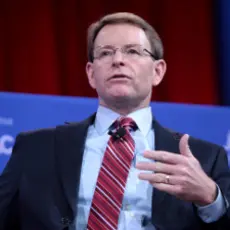Tony Perkins, president of the Family Research Council, was elected chair of the U.S. Commission on International Religious Freedom on Monday, according to a press release. The USCIRF is a bipartisan commission created in 1998 whose members are appointed by the president and congressional leaders.
When Perkins was appointed to the Commission last year on the recommendation of Senate Majority Leader Mitch McConnell, Right Wing Watch noted that his appointment was “deeply troubling given the long track record that Perkins and FRC have had in spreading anti-Muslim rhetoric in the United States.”
As recently as 2015, Perkins claimed that Islam “is incompatible with the Constitution.” That same year, he defended calls to restrict the immigration of Muslims by declaring that “only 16 percent of Islam is a religion.” The year before, he suggested that Christians who support legal equality for LGBTQ people don’t have the same legal protections as more conservative Christians, because a “true religious freedom” has to be “based on orthodox religious viewpoints.”
It’s also worth noting that the Family Research Council is one of the Religious Right groups that have eagerly worked with the most religiously oppressive regimes—those classified by the USCIRF as among the worst for religious liberty—in order to resist international recognition for the rights of LGBTQ people and to defend governments’ right to enforce “traditional” religious views on gender, sexuality, and family.
Several weeks ago, Perkins hosted his fellow USCIRF commissioner Gayle Manchin to talk about the commission’s work. Right Wing Watch noted at the time:
Perkins urged pastors and churches to adopt prisoners of conscience and pray for religious freedom for “every man, woman and child on the face of the planet.” It’s good to hear Perkins affirming that religious freedom is for everyone, because he and his FRC colleague Jerry Boykin have a decidedly mixed record at best when it comes to defending the First Amendment rights of American Muslims.
While some countries, like Russia and China, are moving in the wrong direction on religious liberty, Perkins said, some Middle Eastern countries are trying to do better, which Perkins credited to the efforts of the Trump administration. Last year, though, a group of former diplomats warned that the rise of anti-Muslim and nativist rhetoric in the U.S. was threatening the ability of the U.S. to advocate effectively for human rights and religious minorities overseas.






